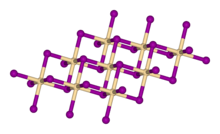Magnesium bromide
Magnesium bromide (MgBr2) is a chemical compound of magnesium and bromine that is white and deliquescent. It is often used as a mild sedative and as an anticonvulsant for treatment of nervous disorders.[2] It is water-soluble and somewhat soluble in alcohol. It can be found naturally in small amounts in some minerals such as: bischofite and carnallite, and in sea water, such as that of the Dead Sea.[3][4]
 | |
| Identifiers | |
|---|---|
| |
3D model (JSmol) |
|
| ChemSpider | |
| ECHA InfoCard | 100.029.246 |
PubChem CID |
|
| UNII | |
CompTox Dashboard (EPA) |
|
| |
| |
| Properties | |
| MgBr2 (anhydrous) MgBr2·6H2O (hexahydrate) | |
| Molar mass | 184.113 g/mol (anhydrous) 292.204 g/mol (hexahydrate) |
| Appearance | white hygroscopic hexagonal crystals (anhydrous) colorless monoclinic crystals (hexahydrate) |
| Density | 3.72 g/cm3 (anhydrous) 2.07 g/cm3 (hexahydrate) |
| Melting point | 711 °C (1,312 °F; 984 K) 172.4 °C, decomposes (hexahydrate) |
| Boiling point | 1,250 °C (2,280 °F; 1,520 K) |
| 102 g/100 mL (anhydrous) 316 g/100 mL (0 °C, hexahydrate) | |
| Solubility | ethanol: 6.9 g/100 mL methanol: 21.8 g/100 mL |
| −72.0·10−6 cm3/mol | |
| Structure | |
| Rhombohedral, hP3 | |
| P-3m1, No. 164 | |
| octahedral | |
| Thermochemistry | |
Heat capacity (C) |
70 J/mol K |
Std molar entropy (S |
117.2 J·mol−1·K−1 |
Std enthalpy of formation (ΔfH⦵298) |
-524.3 kJ·mol−1 |
| Hazards | |
| Safety data sheet | External SDS |
| NFPA 704 (fire diamond) | |
| Related compounds | |
Other anions |
magnesium fluoride magnesium chloride magnesium iodide |
Other cations |
Beryllium bromide Calcium bromide Strontium bromide Barium bromide Radium bromide |
Except where otherwise noted, data are given for materials in their standard state (at 25 °C [77 °F], 100 kPa). | |
| Infobox references | |
Synthesis
Magnesium bromide can be synthesized by reacting hydrobromic acid with magnesium oxide and crystallizing the product.[4] It can also be made by reacting magnesium carbonate and hydrobromic acids, and collecting the solid left after evaporation.[3]
Uses
Magnesium bromide is used as a catalyst for many reactions, the first being a solvent-free one-pot synthesis of dihydropyrimidinones, which are often used in the pharmaceutical world in medications such as calcium channel blockers and HIVgp-120-CD4 inhibitors.[5] It also has been used as a tranquilizer.[3] Magnesium bromide in combination with CH2Cl2 catalyzes a reaction that causes specific symmetry and chiral centers through hydrogenation of alkenes.[6] Magnesium bromide when bonded to other functional groups has shown more practical uses other than catalyzing reactions. When bonded to an ethyl group it is used for regiospecific analysis of triglycerols.[7] Magnesium bromide hexahydrate is being worked with to be used as a flame retardant. It was found that if 0.125 mol/L of magnesium bromide hexahydrate was added to a cotton material it acted as a flame retardant.[8] Magnesium bromide was used to synthesize the first stable magnesium silylenoid. A silylenoid is a compound that contains R2SiMX (M is metal and R is an organic moiety). Traditionally only lithium, potassium, and sodium could be used. The magnesium silylenoid is synthesized through the addition of magnesium bromide to lithium lithium methyl bromosilylenoid. The magnesium atom replaces the lithium in the complex and has a bromide attached to it. This complex is stable at room temperature.[9]
References
- Lide, David R. (1998). Handbook of Chemistry and Physics (87 ed.). Boca Raton, Florida: CRC Press. pp. 4–67. ISBN 0-8493-0594-2.
- Pradyot Patnaik. Handbook of Inorganic Chemicals. McGraw-Hill, 2002, ISBN 0-07-049439-8
- Gruyter, W. Concise Encyclopedia Chemistry, Walter de Gruyter & Company: Berlin, 1993; 612
- Lewis, R.J. Hawley’s Condensed Chemical Dictionary, 15th ed.; John Wiley &Sons Inc.:New York, 2007; 777
- Salehi, Hojatollah; Guo, Qing‐Xiang (2004). "A Facile and Efficient One‐Pot Synthesis of Dihydropyrimidinones Catalyzed by Magnesium Bromide Under Solvent‐Free Conditions". Synthetic Communications. 34 (1): 171. doi:10.1081/SCC-120027250.
- Bouzide, Abderrahim (2002). "Magnesium Bromide Mediated Highly Diastereoselective Heterogeneous Hydrogenation of Olefins". Organic Letters. 4 (8): 1347–50. doi:10.1021/ol020032m. PMID 11950359.
- Ando, Y; Tomita, Y; Haba, Y. Preparation of Ethyl Magnesium Bromide for Regiospecific Analysis of Triacylglycerols Journal of Oleo Science, 2008, 57, 459
- Mostashari, S. M.; Fayyaz, F. (2008). "XRD characterization of the ashes from a burned cellulosic fabric impregnated with magnesium bromide hexahydrate as flame-retardant". Journal of Thermal Analysis and Calorimetry. 92 (3): 845. doi:10.1007/s10973-007-8928-4.
- Lim, Young Mook; Cho, Hyeon Mo; Lee, Myong Euy; Baeck, Kyoung Koo (2006). "A Stable Magnesium Bromosilylenoid: Transmetalation of a Lithium Bromosilylenoid by Magnesium Bromide". Organometallics. 25 (21): 4960. doi:10.1021/om060589w.
